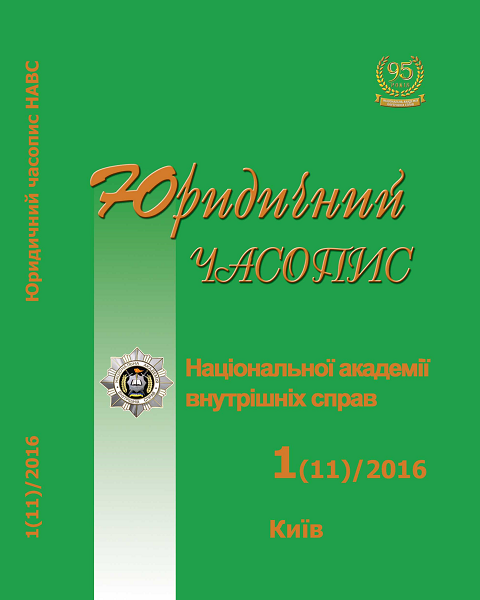Crimes in the Fiscal Sphere: Problems of Implementation of Criminal Responsibility
Keywords:
fiscal crimes, criminal responsibility, tax, levy, tax liabilities, tax compromise, tax optimization, tax planning
Abstract
This article provides a comprehensive analysis of tax evasion, dues (mandatory payments) and the reasons of committing such types of crime in Ukraine. It also shows factors that adversely affect the performance of investigations of criminal fiscal offenses and make impossible collecting evidence in the investigation of crimes under the Art. 212 of the Criminal Code of Ukraine. In the study of actus reus author defines the main ways of distortions of tax liability: infringement in the determining of the range of taxpayers; inadequate documentation of transactions; irregularities in transactions that are exempt of VAT or are not relevant to the economic activities; deliberate understatement of taxation object; non-payment or late payment of taxes. Among the perpetrators various categories of taxpayers, including the large taxpayers are studied. It is emphasized that taxpayers can be divided into three risk groups: high, medium and low. The article concluded that criminal prosecution cases are considered only under the Chapter 22 of the Criminal Procedure Code of Ukraine «Notification of suspicion». Some problematic issues in the sphere of subjection to liability for committing such types of crime are also identified. The author reveals specific types of exemption from criminal liability for the offense under the Art. 212 of the Criminal Code of Ukraine. Some legal gaps that do not allow to release the person from criminal liability in the initiated criminal proceeding because of the statutory bar to recover damages caused by late payment of taxes to the state before the entry into force of the court decision are also studied. The author also submitted a proposal about inappropriate attribution of fiscal crimes, including tax evasion and duties (mandatory payments), to the plane of criminal liability. He also analyzed legal and economic aspects of taxation in the country, ways of optimization of budget revenues, areas of improvement of combating tax evasion both criminal and fiscal nature.Downloads
Download data is not yet available.
Abstract views: 224 PDF Downloads: 376
How to Cite
[1]
Khomenko, V. 1. Crimes in the Fiscal Sphere: Problems of Implementation of Criminal Responsibility. Law Magazine of the National Academy of Internal Affairs. 11, 1 (1), 55-71.
Issue
Section
Combating crimes: theory and practice
Copyright (c) 2017 Law Magazine of the National Academy of Internal Affairs

This work is licensed under a Creative Commons Attribution-NonCommercial-NoDerivatives 4.0 International License.
- Authors reserve the right to authorship of their own work and transfer to the magazine the right of the first publication of this work under the terms of the Creative Commons Attribution License, which allows other persons to freely distribute published work with mandatory reference to authors of the original work and the first publication of an article in this magazine.
- Authors have the right to enter into separate additional agreements on non-exclusive dissemination of the work in the form in which it was published in the journal (for example, to post an article in the institution's repository or to publish as part of a monograph), provided that the link to the first publication of the work in this journal is maintained.
- The journal's policy allows and encourages the posting of articles by authors on the Internet (for example, in electronic storehouses of institutions or on personal websites), both before the submission of this manuscript to the editorial office and during its editorial processing, as this contributes to the creation of a productive scientific discussion and positively affects the efficiency and dynamics of citing the published work.




